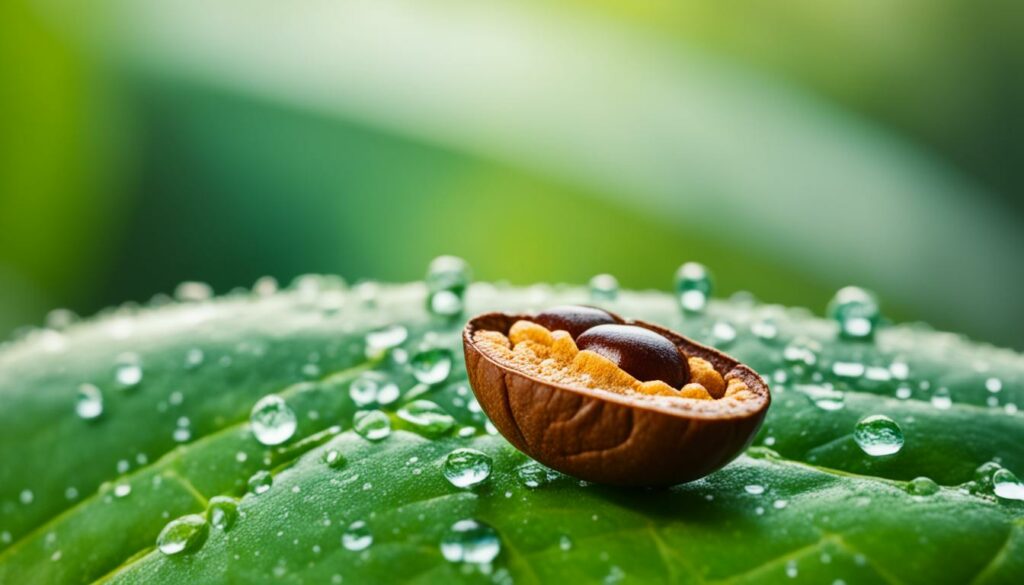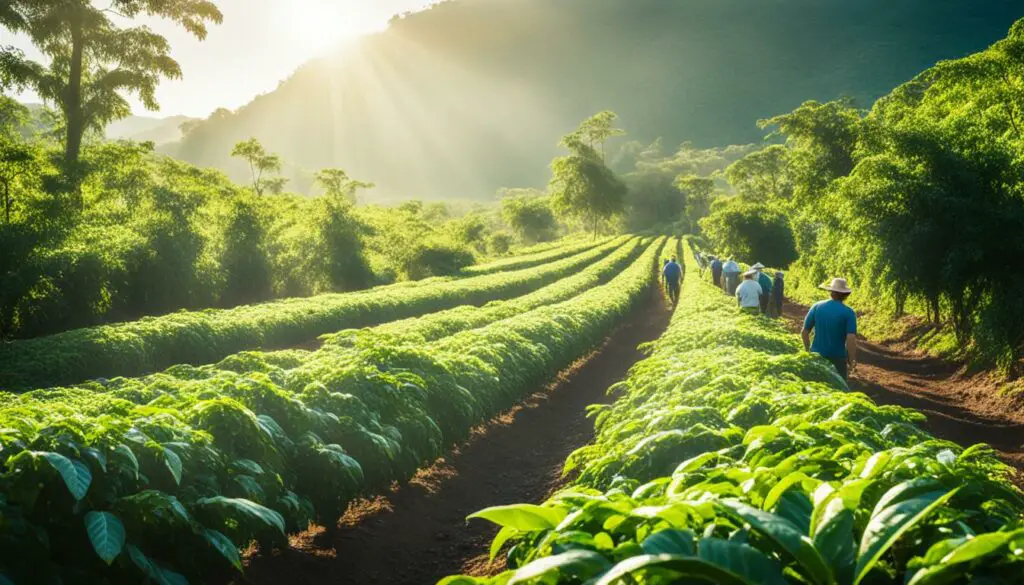I recall the day I found a small organic coffee shop in a quiet neighborhood corner. The aroma of fresh coffee pulled me in, but the barista’s enthusiasm for organic beans truly caught my eye. Drinking my first cup, I wondered about the beans’ journey to my mug.
This encounter sparked my interest in sustainable coffee and its effects on health and the environment. I found out that organic beans are grown without harsh chemicals, making them a healthier choice for consumers and farmers. This led me to delve deeper into the world of organic coffee, discovering its many benefits and distinct flavors.
My research showed that organic coffee is more than a trend; it’s a step towards a sustainable, health-focused future. The health benefits of organic coffee go beyond antioxidants, offering a cleaner, more nutritious alternative to regular coffee.
Let’s explore why choosing organic coffee beans can impact your daily cup and help the environment.
The Rise of Organic Coffee: A Sustainable Revolution
The coffee industry is witnessing a significant shift towards organic coffee. This sustainable movement is transforming how we cultivate, produce, and consume our beloved coffee. Let’s delve into the realm of organic coffee farming and its profound effects on the environment and our health.
Understanding Organic Coffee Cultivation
Organic coffee farming is revolutionizing sustainable coffee production. It eschews synthetic pesticides and fertilizers, opting for natural alternatives. This method not only enhances coffee quality but also safeguards the environment.
Environmental Benefits of Organic Farming Practices
The environmental footprint of organic coffee is substantial. By shunning synthetic chemicals, it preserves water quality and prevents soil erosion. It also diminishes carbon emissions, aiding in the battle against climate change. These sustainable practices foster a healthier ecosystem for coffee plants and wildlife alike.
Impact on Biodiversity and Soil Health
Organic coffee farming enriches biodiversity. Many farms employ shade-grown techniques, replicating coffee’s natural environment. This approach shelters a variety of plant and animal species. The emphasis on soil health in organic farming boosts microbial activity, enhancing nutrient cycling and water retention. It benefits both the environment and coffee quality.
| Aspect | Conventional Coffee | Organic Coffee |
|---|---|---|
| Pesticide Use | Synthetic pesticides | Natural pest control |
| Fertilizers | Chemical fertilizers | Organic compost |
| Biodiversity | Often monoculture | Supports diverse ecosystems |
| Soil Health | Potential degradation | Improved soil structure |
Health Benefits: Why Organic Coffee is Better for You
I’ve discovered that organic coffee offers numerous health advantages. Let’s explore why this pesticide-free coffee is a superior choice for your well-being.
Say Goodbye to Harmful Pesticides
Organic coffee farming practices eliminate the use of synthetic pesticides. This means I can enjoy my morning brew without worrying about ingesting harmful chemicals. Organic coffee is grown without synthetic fertilizers or genetic, making it a safer choice for my health.
Nutrient-Rich Coffee
The health benefits of organic coffee extend beyond being pesticide-free. Organic beans are often more nutrient-rich due to natural farming methods. This means I’m getting more antioxidants, vitamins, and minerals in every cup.

Less Risk of Mold and Toxins
Organic coffee is typically grown at higher altitudes, reducing the risk of mold growth. This means fewer mycotoxins in my coffee, which can contribute to various health issues. By choosing organic, I’m opting for a cleaner, healthier brew.
| Aspect | Conventional Coffee | Organic Coffee |
|---|---|---|
| Pesticides | May contain residues | Pesticide-free |
| Nutrient Content | Standard | Higher in antioxidants |
| Mold Risk | Higher | Lower |
| Environmental Impact | Can be harmful | Eco-friendly |
By choosing organic coffee, I’m not only treating myself to a delicious beverage but also investing in my health. The absence of pesticides, higher nutrient content, and reduced risk of mold make it a smart choice for coffee lovers who prioritize their well-being.
Why Choose Organic Coffee Beans?
I’ve uncovered numerous reasons to opt for organic coffee beans, and I’m eager to share them with you. The advantages of organic coffee go well beyond just a superb cup of coffee. Let’s delve into why switching to organic could significantly impact your health and the environment.
One of the primary benefits of organic coffee is its high nutrient content. These beans are cultivated without synthetic pesticides, leading to a cleaner, more nutritious beverage. This ensures I’m not just enjoying a tasty drink but also feeding my body with each sip.
Opting for organic coffee aids sustainable farming practices that benefit our planet. These methods enhance biodiversity, protect rainforests, and maintain soil health. By choosing organic, I’m aiding a healthier ecosystem and decreasing my carbon footprint.
| Aspect | Conventional Coffee | Organic Coffee |
|---|---|---|
| Pesticide Use | Synthetic pesticides | Natural pest control methods |
| Environmental Impact | Potential harm to ecosystems | Promotes biodiversity |
| Farmer Health | Exposure to chemicals | Reduced health risks |
| Taste Profile | Variable | Often richer and more complex |
There are compelling reasons to choose organic coffee that extend beyond personal health benefits. It’s about backing fair pay for farmers and ensuring environmental sustainability for the long term. By selecting organic, I’m casting a vote for a better future with my purchases.
Organic certification ensures strict compliance with organic farming rules from seed to cup. This gives me confidence, knowing my coffee meets top standards of quality and sustainability.
Flavor Profile: The Taste Difference in Organic Coffee
As a coffee aficionado, I’ve found that organic coffee presents a distinct taste. The flavor profiles of organic coffee beans tend to be more intricate and layered than conventional ones. This article will delve into why organic coffee’s taste is unique and how farming methods shape its flavor.
Organic Farming’s Impact on Flavor
Organic farming significantly influences coffee’s taste. The absence of synthetic pesticides and fertilizers allows coffee plants to develop natural defenses. These defenses enhance the flavor, resulting in beans with depth and character. This makes organic coffee taste distinctly different.
Shade-Grown Organic Coffee
Shade-grown organic coffee exemplifies how cultivation methods impact flavor. These beans mature under a tree canopy, leading to a smoother, less acidic taste. The shade also enables sugars to fully develop, creating a balanced cup with subtle sweetness.

Single-Origin Organic Varieties
Single-origin organic coffee reveals the unique terroir of specific regions. Each variety showcases distinct flavors, influenced by the soil, climate, and altitude. For example, Ethiopian Yirgacheffe surprises with bright, fruity notes, while Colombian Supremo offers rich chocolate undertones.
| Origin | Flavor Notes | Acidity | Body |
|---|---|---|---|
| Ethiopian Yirgacheffe | Floral, citrusy | High | Light |
| Colombian Supremo | Chocolate, nutty | Medium | Full |
| Sumatran Mandheling | Earthy, herbal | Low | Heavy |
Exploring these diverse single-origin organic coffees deepens your appreciation for their complex flavors. Each sip narrates its origin, enriching your coffee experience with a sense of place and tradition.
Conclusion: Embracing Organic Coffee for a Better Future
Organic coffee transcends mere trend status, representing a beacon for a sustainable and flavorful future. By opting for organic beans, we champion sustainable practices that safeguard our environment and enhance the welfare of farmers. This choice is a commitment to a healthier planet and palate.
The organic coffee sector is witnessing exponential growth, driven by its superior taste and potential health advantages. Although it may come at a premium, this investment supports eco-conscious consumption and ensures fair compensation for producers. It’s a small price to pay for a product that’s both good for us and the earth.
Let’s initiate a transformation, one cup at a time. We can begin by selecting certified organic brands, adopting reusable filters, and composting our coffee grounds. These incremental changes cumulatively lead to significant environmental benefits. United, we can craft a sustainable future while savoring coffee that’s both delightful and ethically sourced.
FAQ
What are the benefits of organic coffee farming methods?
Organic coffee farming ensures the land is free from pesticides and artificial additives. It employs sustainable techniques like crop rotation and composting. These methods focus on soil health, biodiversity, and ecological balance, fostering a healthier environment.
How does organic coffee benefit the environment?
Organic farming cuts down on harmful chemicals, safeguarding water and preventing “ocean dead zones.” It mimics the natural habitat for coffee plants, preserving biodiversity and improving coffee quality. Additionally, it supports carbon sinks and protects rainforests.
Why is organic coffee better for my health?
Organic coffee reduces exposure to pesticides linked to health problems like reproductive issues and cancer. It’s richer in nutrients due to organic farming and less likely to have toxic molds. Organic coffee also promotes a healthier gut by avoiding pesticides that harm gut health.
What are the key reasons to choose organic coffee beans?
Organic coffee is more nutrient-rich, protects consumers and farmers from pesticides, and preserves biodiversity. It supports carbon sinks and offers a superior taste. It also meets strict organic farming standards from growth to roasting.
How does organic farming influence the flavor of coffee?
Organic coffee often boasts a complex and nuanced taste due to sustainable farming. Shade-grown organic coffee tends to be smoother and less acidic than conventional types. Single-origin organic coffees reveal unique flavors tied to their specific growing regions.
How can I adopt sustainable coffee habits?
Start by choosing certified organic, fair trade, or rainforest alliance coffee. Use reusable filters and cups, and compost coffee grounds. Support sustainable coffee shops. While organic coffee may cost more, it reflects the value in sustainable farming, fair labor, and environmental care.












